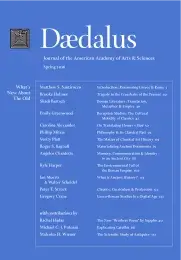What is Ancient History?
Every society has told stories about ancient times, but contemporary ancient history was the product of two main developments. The first was the invention of writing, which made scholarly study of the past possible, and the second was the explosion of knowledge about the world from the eighteenth century onward. Europeans responded to this explosion by inventing two main versions of antiquity: the first, an evolutionary model, was global and went back to the origins of humanity; and the second, a classical model, treated Greece and Rome as turning points in world history. These two views of antiquity have competed for two hundred and fifty years, but in the twenty-first century, the evidence and methods available to ancient historians are changing faster than at any other time since the debate began. We should therefore expect the balance between the two theories to shift dramatically. We close by considering some possible areas of engagement.
Ancient history is the study of beginnings, and is thus organized around two central questions: 1) how to define the subject matter whose beginning is being studied; and 2) what that beginning means for the world that the studiers live in. Across the centuries, the answers ancient historians have offered to these questions have changed significantly, largely in response to new evidence and new methods. But now, in the twenty-first century, the evidence and methods available are changing faster than at any time since the eighteenth century, and we should expect the answers ancient historians offer to do the same.
Ancient history has always been with us because, so far as we know, every society has had stories about its beginning. In the absence of writing, however, ancient history could never be much more than myth-making. Such stories usually describe the world's creation and peopling, as well as the origins of the particular group telling the myth. Since most adults in the world were still illiterate as recently as 1960, for most of our time on earth, these hazy, once-upon-a-time worlds–worlds which Aboriginal Australians describe with the wonderfully evocative term “the dreamtime”–were the only ancient history possible. . . .
